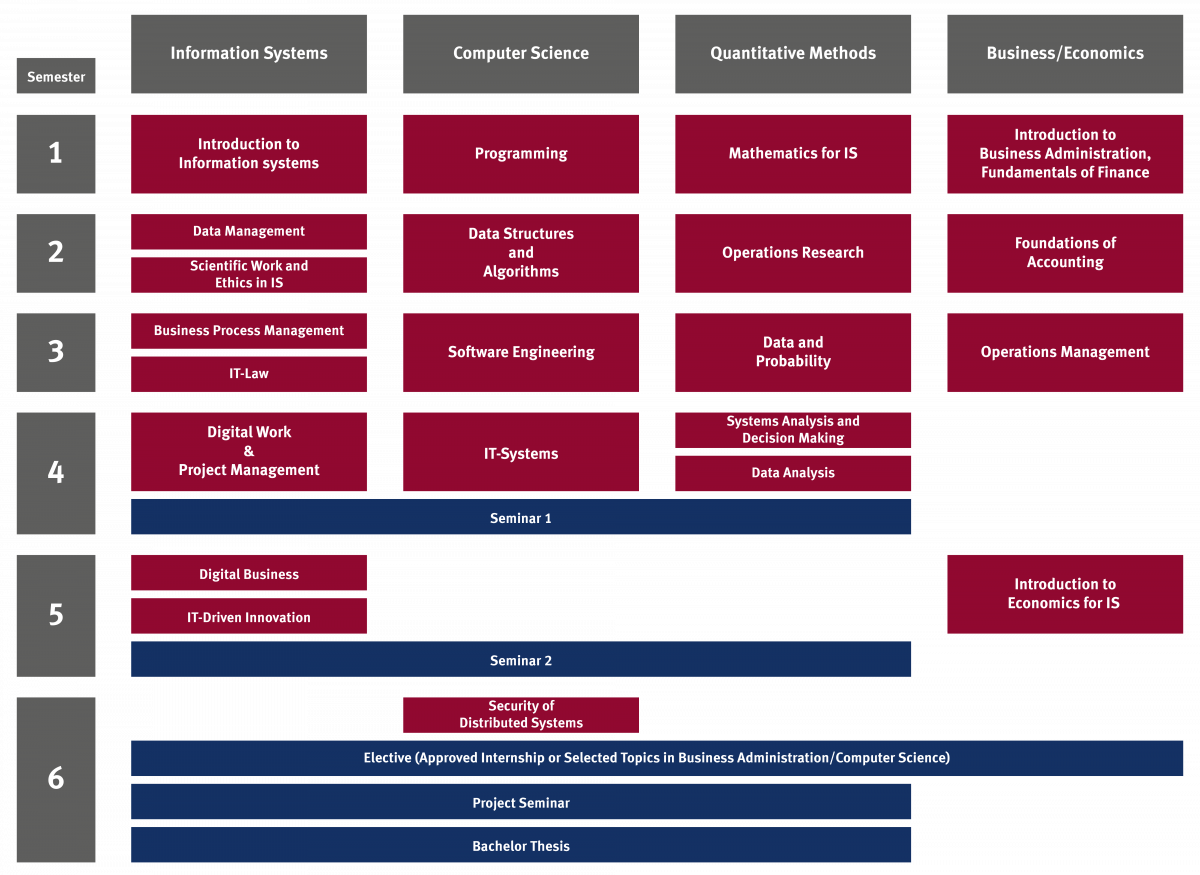
| Degree title | Bachelor of Science (B. Sc.) |
|---|---|
| scope | 180 ECTS |
| period of study | 6 semester, full-time |
| START | winter term |
| language | German or English depending on the module |
| application period | 10th May to 15th July |
Apply now! ≫ Further information on application and admission
This degree program offers you:
The Bachelor of Science in Information Systems combines the best of two worlds: business administration and computer science. In this hands-on program, you will learn not only how to optimize modern technologies, data management and software development, but also how to use them to make companies fit for the digital future.
The program provides not only in-depth technical knowledge, but also a comprehensive understanding of business fundamentals. With this combination of business administration and computer science, you will be ideally prepared to strategically implement innovative IT solutions and actively shape digital transformation.
Your interdisciplinary expertise will make you a sought-after specialist at the interface between business and IT. Whether in large corporations, start-ups or as an entrepreneur - the possibilities are endless. Your path to an exciting and forward-looking career starts here!
Here is what your studies in Münster could look like:

-
Perfect start!
You have no prior knowledge of Information Systems? No problem! Our onboarding module “Introduction to Information Systems” will prepare you perfectly. Together with your fellow students, you will get a comprehensive overview of the most important topics that will accompany you throughout the rest of your studies. You will get to know the diversity of business informatics in terms of research and practice.
You will lay the foundation for your studies in the introductory phase. In exciting introductory courses, you will learn the basics of programming, mathematics and business administration. You will learn everything you need during your studies. However, you should have an interest in mathematics, computer science and business. You should not be intimidated by mathematical issues.
-
Design your studies!
While the first part of the bachelor's program provides you with all the important basics, from the 4th semester onwards you have the opportunity to sharpen your personal profile in the broad field of Information Systems. Our elective modules give you an insight into the latest research and practical areas of Information Systems. By choosing electives in the second part of your bachelor's degree, you decide what you want to specialize in.
In addition to many exciting topics in Information Systems, you also have the opportunity to specialize in the areas of business administration and computer science.
-
From theory to practice!
Immerse yourself in the world of work: An internship in a company gives you valuable insights into real work processes and offers you the opportunity to put your knowledge into practice. In our project seminars, you will also work on real scenarios from the corporate world - not only will you get to know the processes first hand, but you will also make your first valuable contacts for your professional future.
Do you dream of starting your own business? With the support of the REACH - EUREGIO Start-up Center, you can turn your start-up idea into reality!
-
Going abroad!
Spread across six continents, you can choose from over 125 partner universities for an exciting and customized semester abroad. Our international partnerships make it easy for you to organize your stay abroad and give you unique insights into other cultures and university systems. The International Relations Center (ICR) is here to help you organize your study abroad experience.
Thanks to a wide range of English-language modules and a variety of language courses in Münster, you will be well prepared for your international career step. At the same time, you will make valuable contacts with companies during your studies: Guest lectures, excursions and practice-oriented project seminars make the combination of theory and practice an integral part of your everyday studies.
≫ More information about the structure of the program
This is what our students say
Career Prospects
What can you do after graduating in Information Systems?
With a degree in Information Systems, you have exciting career prospects in forward-looking areas! Graduates are sought-after experts who build bridges between business administration and IT and develop innovative solutions.
-
Possible Job Profiles
Information System specialists are in demand in many areas due to their interface expertise in business and IT. Typical occupational fields are:
1. IT Management and IT Strategy
- IT Project Management
- IT Consulting (e.g., Strategy Development, Process Consulting)
- IT Governance and IT Compliance
2. Data Analysis and Business Intelligence
- Data Scientist or Data Analyst
- Business Intelligence Specialist
- Big Data Engineer
3. Software Development and Architecture
- Full-Stack Developer
- Software Architect
- Mobile App Development
4. Digitalization and Process Management
- Business Process Manager
- Digitalization Expert
- Change Manager
5. IT Security and Data Protection
- IT Security Consultant
- Data Protection Officer
- Cybersecurity Analyst
6. ERP and CRM Systems
- SAP Consultant or Developer
- CRM Consultant
- ERP System Administrator
7. E-Commerce and Online Marketing
- Digital Marketing Manager
- E-Commerce Specialist
- Web Analyst
8. Finance and Controlling (IT-Supported)
- IT Controller
- Process Manager in Finance
- Implementation of Financial Software
9. Consulting and Auditing
- IT Consultant in Management Consulting
- IT Auditor (e.g., in Accounting Firms)
10. Research and Teaching
- Research Associate
- Lecturer in Information Systems
- Research in the field of Artificial Intelligence or System Development
These career paths can vary depending on specialization and interests. Information System professionals often work at the intersection of technical and business issues, bringing an interdisciplinary perspective.
-
Your path to success
During your studies, you will have numerous opportunities to make valuable contacts with companies and alumni who can help you start your career. These events not only offer you valuable insights into various industries, but also the chance to expand your network and get to know potential employers.
These include:
- Annual career fairs such as the Business Contacts, consultingcontact and the JobHub IT
- Regular lectures, lecture series, guest lectures, and other events
- Networking and coaching services of the REACH EUREGIO Start-up Center
- Student initiatives
- Workshops of the Career Development Centers (CDC) of the School of Business and Economics
More opportunities with a Master's degree!
The bachelor's degree also qualifies you for further master's programs, such as the international, English-language Master's in Information Systems at the University of Münster, or other related disciplines. A master's degree offers you the opportunity to deepen your knowledge and qualify you for a career in the private sector as well as for a doctorate.
Instagram account of Information Systems in Münster
Would you like to get a first impression of Münster - of the city, the Information Systems program and the diverse student life here?
Go to Instagram ≫ Take a look at our Instagram account!
Research at the Department of Information Systems
The research we carry out is geared towards high scientific relevance and application orientation. What does that mean? It means that we use theoretical findings and fundamental sciences to develop models and processes for practical implementation.
Due to the different specialisations of our professorships and working groups, we cover a wide spectrum of topics related to information systems. Our research projects are supported and funded by the Federal Ministry of Education and Research, the Federal Ministry of the Interior, the Deutsche Forschungsgemeinschaft, the European Union, the Stiftung Industrieforschung, the Bertelsmann Stiftung, NATO, Procope and partner companies.
Our research is integrated in the work of the European Research Center for Information Systems (ERCIS). ERCIS is an international network of prestigious research institutions. The network is known for its excellent collaborations and uncomplicated manner of initiating research projects. Its other strengths include the personal contact between researchers and the wide spectrum of different perspectives it offers on information systems research, both in terms of disciplines and nationalities.
See the subpages here to find out more about our research projects, academic publications, awards received and our IS Work Reports, which are published regularly. The Department of Information Systems has been publishing the freely available IS Work Reports featuring the latest research results since 1991.
Münster: The ideal place to study
With over 60,000 students, Münster is one of the largest university cities in Germany. In 2004, Münster was awarded the LivCon Award as the most livable city in the world and has always been one of the most livable cities in Germany.
In addition to the university education, Münster is characterized by a lively student lifestyle. From days spent sailing or walking around the Aasee and engaging in water sports on the canal to long nights in the numerous bars and clubs, to a wide range of cultural and sightseeing opportunities, Münster has something to offer for all students! More information about student life in Münster and the university's initiatives including sports and cultural offerings can be found here!
Do you have an questions?
Take a look at our FAQ or contact us:
Dr. Lena Clever
Leonardo Campus 3, 48149 Münster
Room 314
info.bachelor@wi.uni-muenster.de
(Consultations by appointment via Email)


